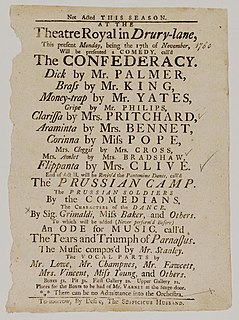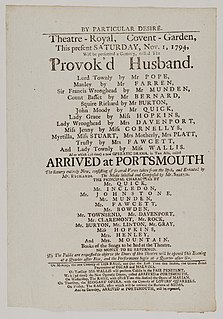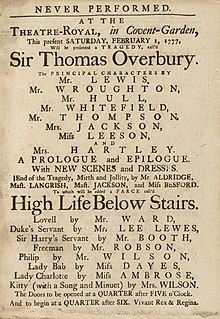Related Research Articles
The Natural Son is a comedy play by the British writer Richard Cumberland. It was first staged at the Drury Lane Theatre in London in December 1784. The play is notable for the return of the popular character Major O'Flaherty from Cumberland's 1771 play The West Indian.
The Battle of Hastings is a 1778 play by the English writer Richard Cumberland. It is a tragedy set around the Battle of Hastings in 1066. It was staged at the Drury Lane Theatre in October 1778 by Richard Brinsley Sheridan. Sheridan later mocked Cumberland's sensitivity to criticism by modelling the character Sir Fretful Plagiary, in his 1779 play The Critic, after him.
The What D'Ye Call It is a 1715 farce by the British writer John Gay. It was written as a parody of tragic plays, with particular reference to Thomas Otway's Venice Preserv'd.
The Imperial Captives is a 1720 tragedy by the British writer John Mottley.
Antiochus is a 1721 tragedy by the British writer John Mottley. The play is set in Ancient Greece, revolving round the relationship between Stratonice of Syria and Seleucus I Nicator and his son Antiochus I Soter, the leaders of the Seleucid Empire.

The Refusal, Or, The Ladies Philosophy is a 1721 comedy play by the British writer Colley Cibber. It is a reworking of the 1672 farce Les Femmes Savantes by Molière, with reference to the recent South Sea Bubble.
Busiris, King of Egypt is a 1719 tragedy by the British writer Edward Young. It is set in Ancient Egypt during the reign of Busiris. It was considered a success, enjoying a good run and was subsequently published by Jacob Tonson. The work was dedicated to the Duke of Newcastle who as Lord Chamberlain oversaw the theatres.

The Confederacy is a 1705 comedy play by the English writer John Vanbrugh. It is also known as The City Wives' Confederacy. The plot was inspired by a 1692 farce by the French writer Florent Carton Dancourt. Two years before Vanbrugh's work, another writer Richard Estcourt had produced another play The Fair Example based on Dancourt's original.
King Charles I is a 1737 tragedy by the British writer William Havard. Written as an imitation of the style of Shakespeare's history plays, it focuses on the imprisonment of Charles I following his defeat in the Civil War and execution by the English Republic. It was a major success and anticipated later works by portraying Charles as a devoted family man who is undone by the scheming of Oliver Cromwell and his allies.
Fatal Curiosity is a 1737 tragedy by the British writer George Lillo. It is also known by the alternative title Guilt Its Own Punishment.
The Christian Hero is a 1735 tragedy by the British writer George Lillo. It is based on the life of Skanderbeg who led a rebellion against the Ottoman Empire in the fifteenth century. Two years earlier William Havard had written Scanderbeg, another work based on his life.
Sophonisba is a 1730 tragedy by the British writer James Thomson. It is based on the story of the Carthaginian noblewoman Sophonisba who committed suicide rather than be paraded in a Roman triumph at the end of the Second Punic War. The story has been made into a number of plays including Nathaniel Lee's restoration tragedy Sophonisba and Voltaire's later Sophonisbe.
Orestes is a 1731 tragedy with musical elements by the British writer Lewis Theobald, based on the Ancient Greek story of Orestes.

The Provoked Husband is a 1728 comedy play by the British writer and actor Colley Cibber, based on a fragment of play written by John Vanbrugh. It is also known by the longer title The Provok'd Husband: or, a Journey to London.
The Mother-in-Law is a 1734 comedy play by the British writer James Miller. Also known by the longer title The Mother-in-Law, or the Doctor the Disease it debuted at the Haymarket Theatre in London.
The Perplexities is a 1767 comedy play by the British actor and writer Thomas Hull. It was a reworking of an earlier Restoration-era play Adventures of Five Hours by Samuel Tuke, itself based on an original Spanish work.
Gil Blas is a 1751 comedy play by the British writer Edward Moore. It is based on the novel Gil Blas by French writer Alain-René Lesage.

High Life Below Stairs is a 1759 comedy play by the British writer James Townley. An afterpiece, it premiered at Drury Lane on a double bill with a revival of Dryden's The Mourning Bride. A popular hit, it was frequently revived.
The Triumphs of Love and Honour is a 1731 tragedy by the British writer Thomas Cooke.
The Non-Juror is a 1717 comedy play by the British writer Colley Cibber. It is inspired by Molière's 1664 work Tartuffe.